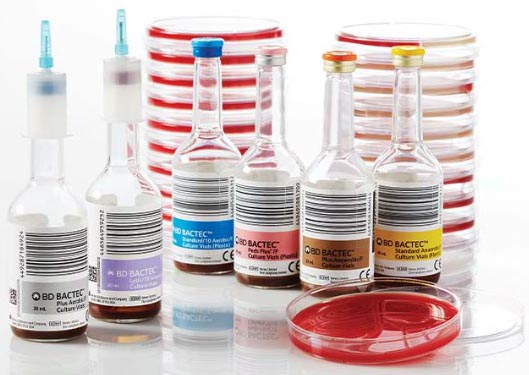America facing a shortage of blood culture media bottles; many critical blood tests cannot be conducted
Nikhil Prasad Fact checked by:Thailand Medical News Team Jul 25, 2024 1 year, 7 months, 8 hours, 39 minutes ago
U.S. Medical News: In a time when precise and rapid medical diagnostics are crucial, the United States is grappling with a severe shortage of blood culture media bottles. These bottles are essential for conducting critical blood tests that detect infections and guide appropriate treatment plans. The shortage, which has been ongoing for weeks, has prompted urgent warnings from federal health officials and led to significant disruptions in hospital and laboratory operations across the country.
 America facing a shortage of blood culture media bottles; many critical blood tests cannot be conducted
The Importance of Blood Culture Media Bottles
America facing a shortage of blood culture media bottles; many critical blood tests cannot be conducted
The Importance of Blood Culture Media Bottles
Blood culture media bottles are used to grow microorganisms from blood samples, allowing healthcare providers to identify pathogens and determine their susceptibility to specific antibiotics. This process is vital for diagnosing and treating conditions like endocarditis, sepsis, and catheter-related blood infections. Without these bottles, patients may be subjected to broad-spectrum antibiotics, which increases the risk of antibiotic resistance and Clostridium difficile-associated diarrhea.
The shortage comes at a time when the warmer season in the United States is causing the surge in a variety of bacterial infections ranging from contaminated food supplies to water sources witnessing a high bacterial growth to even the rise of various sexually transmitted diseases. Many hospitals across America are unable to conduct the relevant critical blood test and are at a stage of offering sub-standard treatment protocols and are navigating healthcare procedures ‘blindly’.
Dr Krutika Kuppalli, a spokeswoman for the Infectious Diseases Society of America told local
U.S. Medical News media outlets, "Without the ability to identify pathogens or their susceptibility to specific antibiotics, patients may remain on broad antibiotics, increasing the risk of antibiotic resistance and Clostridium difficile-associated diarrhea,"
The Scope of the Shortage
The shortage predominantly affects the BD Bactec blood culture media bottles, which are used in approximately half of all U.S. laboratories. These bottles are compatible only with BD's continuous-monitoring blood culture systems, which operate unattended and alert lab workers when a foreign microorganism is detected in a blood culture.
BD Diagnostic Solutions President Nikos Pavlidis explained that the shortage stemmed from a "reduced availability of plastic bottles from our supplier that has prevented us from manufacturing BD Bactec media to meet full global demand."
In response, BD has asked its former supplier of glass vials to restart production to help fill the supply gaps. Despite these efforts, the company has warned that the shortage could continue until September.
Impact on Healthcare Facilities
The shortage has already had a significant impact on hospital and lab oper
ations. For instance, one major hospital in Massachusetts, a 1,800-bed hospital, received only 10 bottles in its recent shipment, leaving them with less than a week's supply on hand. The medical director of the hospital’s microbiology lab commented, "It does become a risk decision - is no blood cultures for any patient worse or better than having one set for all patients, and it's an extremely difficult thing. I don't think it makes any of us happy that we're doing this, by any means, and I think it's fairly important to say that that is absolutely not the standard of care, but we've been forced into a situation where we can't provide the standard of care due to this shortage."
U.S. CDC and U.S. FDA Response
In response to the shortage, the Centers for Disease Control and Prevention (CDC) has issued guidelines urging hospitals to reduce the number of blood culture tests performed, preserving them for the most critical cases.
https://www.cdc.gov/healthcare-associated-infections/bd-bactec-availability/index.html
"Several studies have demonstrated that unnecessary blood cultures can be reduced without an increase in adverse events," the U.S. CDC noted. These studies can serve as a template for healthcare facilities to reduce the number of unnecessary blood cultures performed.
Similarly, the U.S. Food and Drug Administration (FDA) has acknowledged the disruption and added blood culture media bottles to the Medical Device Shortages List.
https://www.fda.gov/medical-devices/letters-health-care-providers/disruptions-availability-bd-bactec-blood-culture-media-bottles-letter-health-care-providers
The FDA is closely monitoring the situation and has recommended that laboratories and healthcare providers develop conservation strategies to prioritize the use of blood culture media bottles based on clinical need.
Conservation Strategies
To mitigate the impact of the shortage, the FDA has outlined several strategies for healthcare providers:
-Performing blood culture collections only when medically necessary and following clinical guidelines.
-Prioritizing the use of bottles for patients with clinical signs and symptoms of bloodstream infections.
-Ensuring routine disinfection of skin protocols prior to collection to minimize contamination risk.
-Collecting proper blood volumes to avoid the need for additional samples.
-Utilizing safe blood collection and transfer devices to minimize the risk of damage to blood culture media bottles.
The Path Forward
As the shortage continues, healthcare providers are faced with challenging decisions about how to best manage their limited resources. The situation highlights the fragility of supply chains for critical medical supplies and the need for robust contingency plans.
The U.S. FDA and U.S. CDC are committed to keeping healthcare providers and the public informed as new information becomes available. Meanwhile, hospitals and labs are adapting their protocols and seeking innovative solutions to ensure patient care remains uncompromised.
This shortage serves as a stark reminder of the interconnectedness of global supply chains and the importance of maintaining a steady supply of essential medical equipment. As efforts to resolve the shortage continue, the healthcare community remains vigilant, striving to balance the demands of immediate patient care with the constraints imposed by limited resources.
For the latest
U.S. Medical News, keep on logging to Thailand Medical News.
Read Also:
https://www.thailandmedical.news/news/northern-manitoba-in-canada-declares-health-emergency-amid-severe-nursing-shortage
https://www.thailandmedical.news/news/america-s-healthcare-sector-facing-a-crisis-due-to-an-acute-shortage-of-doctors-the-dwindling-availability-of-primary-care
